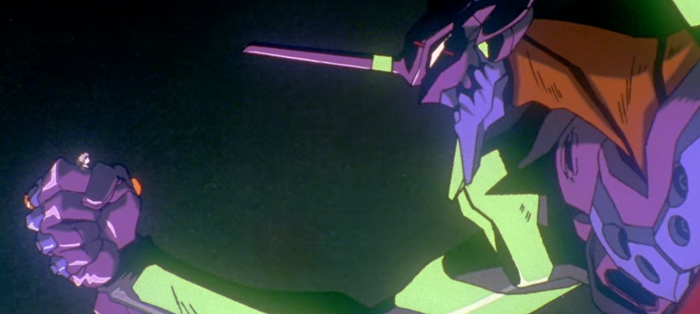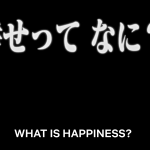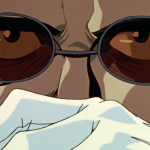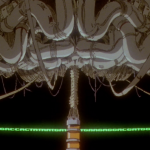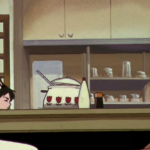Revangelion: Part 24 – The Cruel Last Cometh
Hello again. Present-Adam is here for another essay lead-in. All I really need to say is that my past self was angry when he wrote this essay. In fact, he was right properly pissed off at Evangelion while harbouring some mild resentment toward people who seemed to get Evangelion in a way he couldn’t. I’ve chilled out considerably since then, but I’m also not going to interrupt my past self as he goes on a tear.
See you at the end.
I am so far away from the cognitive space that I was in when I started this project. This series, with its endless demands that the audience be a therapist for the characters – as proxies for the creator – has left me exhausted. I don’t care anymore. I’m done trying to learn. I’m done trying to empathize. Angels. Gendo. Whatever. It doesn’t matter.
I’ve given up on trying to figure out if Evangelion wants more from its audience than to be seen. What it might have been doing in the single digit episodes is so far off the rails from the Kaworu episode that I am at a loss. This is the moment when I lean in, look at the camera, and tell you that I’m at the end of my rope.
There are, as one attempts to build some sort of order out of the utter chaos and expositive spew that is this episode, two paths before us. The first path is accepting that Evangelion is insane. I like that option because it takes a lot of the pressure off me.
Under that lens, whatever Evangelion drives toward is lost on all but the most obsessed graduate student. The true purpose of the series is buried under disjointed – and yet deeply ambitious – metaphors and symbols. The plot, such as it is, is effectively meaningless. The story’s genetic code is missing something essential, leaving pathos as the only thing for the audience to lock onto. Evangelion demands more and more pity for the characters as the line between author and audience blurs. Who is seen? Who is seeing? Who knows, and more importantly who cares?
The other option at hand is the gold standard for lazy sitcom writers: it’s not you, it’s me. In other words, Evangelion is a brilliant work of art that everybody gets, except for this pathetic boor. Unlike all of you, I can’t see my way to understanding Hideki Anno’s grace. Frankly, I don’t think that’s the case. I might lack some of the easy paths to processing the religious symbolism, but my efforts to parse them through deeper research have routinely led to half-baked mysticism that has as much grounding in religious texts as does the backstory to Diablo. That is to say, it sounds kind of religious-ish.
In service of the first point, because there’s not much to say if I resign myself to the second, the only meaningful thing to latch on to in this episode is the whirlwind relationship between Shinji and Kaworu. Rest assured, I will spare the world another deep dive on Netflix’s subtitles being substandard. I made that point ages ago, and I’m not the guy to lead the charge on the implications of putting Kaworu and Shinji’s non-platonic energy into the closet.
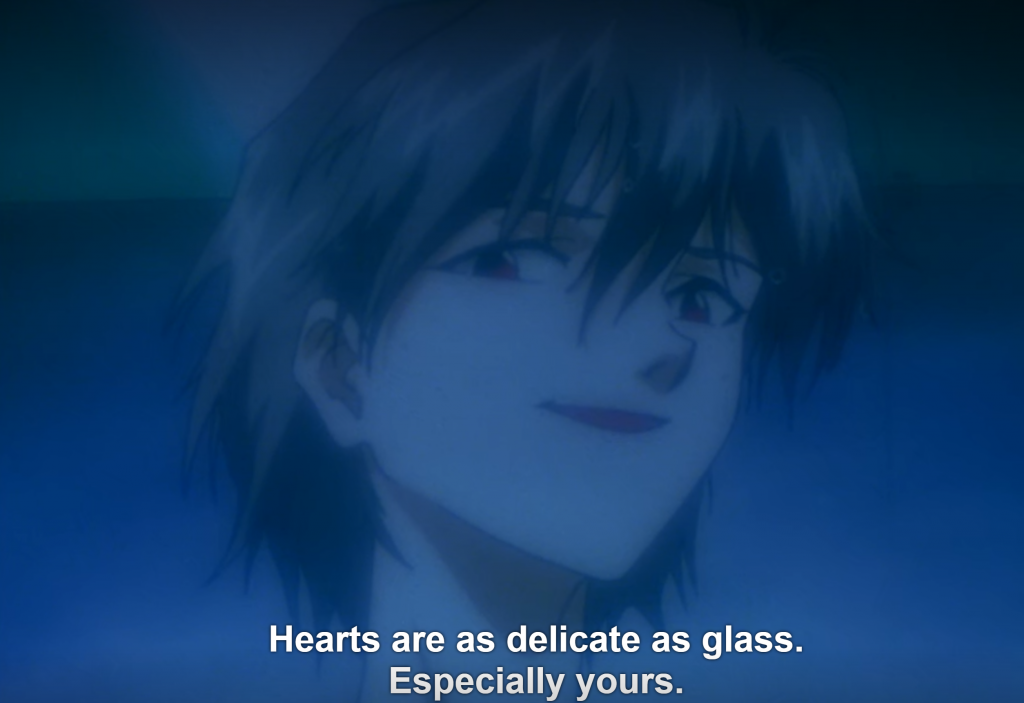
I will say that the episode cheats its way to emotional affect. The perceived depth of the relationship is rooted in the fact that after twenty-three episodes, the audience is desperate for something nice to grab on to. Set against the last episode ending on Ritsuko’s mass murder of the Rei clones because Gendo didn’t love her the right way, Kaworu being nice to Shinji is a welcome breath of relatable storytelling.
That said, it’s clear from the start that the relationship is doomed. Normal humans don’t talk about songs being the greatest achievement of “Lilin civilization.” Likewise, normal humans don’t wax poetic about the inherent isolation of human life upon meeting someone new. Kaworu-as-the-final-angel is as obvious as Bojack Horseman’s Vincent Adultman being three kids in a trench coat. Why don’t the other characters see it? Because you should know better than to ask questions like that at this point in the series.
Obvious things go unseen at NERV because if they didn’t there wouldn’t be a story. Duh.
Thus with only two episodes left, and a desire to punish Shinji one last time, Hideki Anno had to force depth into Shinji and Kaworu’s relationship. The story skips the flirting and foreplay, opting instead to go right to naked hand holding in the showers and confessions of grace love. It’s a cheat. A half-baked and telegraphed cheat.
The series burnt entire episodes on deep dives into character backstories that were little more than pale rationalizations for why characters are the way they are. Couldn’t we have used this particular cheat on those less-essential narrative beats? Such a choice could have freed up the time to organically grow the Shinji-Kaworu relationship. As this episode is presented, there is less character development and more a demonstration that Hideki Anno let this story get away from him.
What’s worse is that in an episode that should be 100% focused on Shinji, The Last Cometh opens on a flashback. We see looped footage of wee-Asuka running home to tell her mother that she made the Eva program, only to find that her mother had hanged herself. That’s how weak this episode is; it needs to prime the emotional pump by opening on Asuka’s mom and then bookending that loss with Kaworu’s death.
While the audience might be inclined to engage with that particular bit of tragic symmetry, Asuka’s plight is imminently forgettable amid this episode’s B-plot of brutal exposition on how NERV has got away from SEELE. There’s also a mess of utterly impenetrable nonsense about angels being progenitors of black eggs and white moons. What in the actual fuck is this show talking about? And how exactly is anybody meant to hold on to Asuka’s loss as an emotional beat when they are bombarded with all this jibberish?
Even after Kaworu takes control of Eva-02, the writing insists on banging its drum on the nature of AT fields. Those paying attention at home will also notice how parts of NERV are named after a crush of references to Dante’s Inferno. What’s that, you want an example? Okay. I’ll give you an example. During Kaworu’s invasion, he and Eva-02 pass through the Maleboge level of NERV. In the poem, Maleboge is the eighth circle of Hell. It’s the place where seducers, panderers, flatterers, astrologers, hypocrites, falsifiers, scandal mongers, thieves, and bad advice givers end up for eternity.
Great, fantastic metaphor. Except nobody except literal Dante scholars got it without having to pause the show and look it up. Once they did, it probably led them to what I’ve been saying all along: NERV are the bad guys in all this. The geofront is a metaphor for hell and Gendo is Lucifer…wait, I thought the whole point of the Inferno was to create sympathy for Lucifer. The meatphor falls apart if Gendo, the objective Bond villian is the light bringer. Well shit, now I’m really confused.
Amazing job, Hideki Anno. Glad I found the time to do some research while your story was busy blathering about progenitors of Lilin and how the Spear of Longinus was somehow getting in the way of Gendo’s plans. Also SEELE manufactured Kaworu? What? I’d ask questions but that would further distract from the fact that this episode is trying to do a romantic tragedy in 20 minutes.
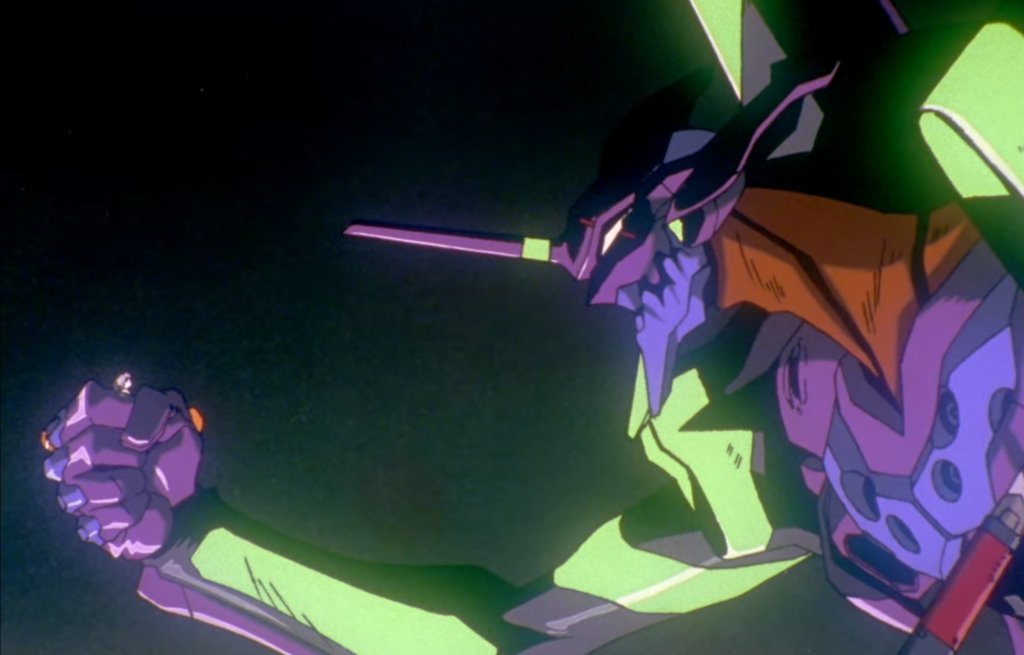
Perhaps that is one more reason why Shinji’s conscious decision to kill his (boy)friend falls flat in the epilogue. Misato hits him with a line about how only people with the will to live should survive. Shinji’s response it to say, “That’s cold.”
Really? That’s what the audience gets after Shinji smushed his boyfriend with his mech’s fist?
Where is the rage? Where is the Shinji scream? Toji’s injury merits taking an Eva hostage and threatening to destroy NERV HQ. Shinji killing the only person who, by Shinji’s admission, ever told Shinji he was liked – that he was worthy of love – merits naught but sober contemplation? If the writing is attempting to convey shock or trauma, it is not landing with me. The delicacy with which I might otherwise be inclined to handle this moment is lost amid a relentless onslaught of world building and visible character inconsistencies.
In what should be the emotional coda to the series, because we damn well know that the balance of the series is an impenetrable mess, all we get is a damp squib. Shinji killing his boyfriend is almost secondary to a desperate gamble to build some order into the story’s long-arc. It’s a pointless effort, frankly. It’s also distraction from the fact that Shinji’s surrender to Gendo’s will – the acceptance of his life as a puppet on strings – is not even met with a whimper.
A note from a version of me who has finished watching the entirety of the series, for a third and final time, and is now free to connect the dots that past-Adam could not quite see:
Past-Adam really hauled off on this episode. I think the obvious counter point to his argument is that the lack of emotion from Shinji is likely the episode’s effort to shade him as so fundamentally broken that he is beyond the capacity to process emotion. Killing Kaworu crushed his humanity. This is why Shinji initially chooses to cut himself off from Instrumentality, and must be cajoled into joining the collective.
But let’s reflect on Past-Adam’s obvious anger. The show pissed him off. Evangelion asks for a world of leeway and rewards nothing in return. Consequently, my younger self was beyond giving a damn about deep readings. From his point of view, deep readings were a rube’s game in a series that kept changing tone, direction, and focus. Why spend the time doing critical heavy lifting when Evangelion’s juking and jinking evade all but the most convoluted of readings of this story.
Maybe Shinji was traumatized. Maybe Shinji felt nothing, outwardly, about Kaworu as a defense mechanism. Maybe production problems on the series broke up something that should have been a unified theme. Past-Adam felt there was no way to answer any of those questions without making apologies for a story filled with holes. The anger took on a singular bitterness as Past-Adam witnessed writers and critics he admired banging on about Evangelion as high art. What were they seeing? Why were the wild inconsistencies somehow forgivable to others but not to him?
I mean, if Angels want to destroy the world, why did SEELE make Kaworu? If all of the story is unfolding as prophesied in the Dead Sea Scrolls, would there not be a way around, you know, the whole story? Of course, answering that question would require understanding SEELE’s motivation in the first place. None of these details are forthcoming. Arguably, none of them matter to a story that is entirely living in a place of extended pathos.
This is why past-Adam was angry.
A fundamental pointlessness in taking a critical eye to Evangelion had won over. Ennui turned to anger because if nobody else saw what he saw, then that meant there may have actually been something fundamentally broken inside of him.
As for present-Adam, Hideki Anno doesn’t get that kind of power over me. A bad story is a bad story – not an empathy test.

